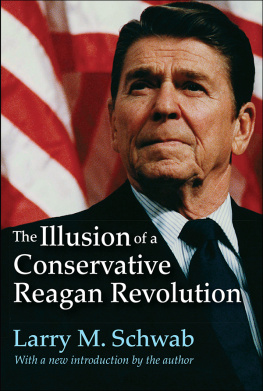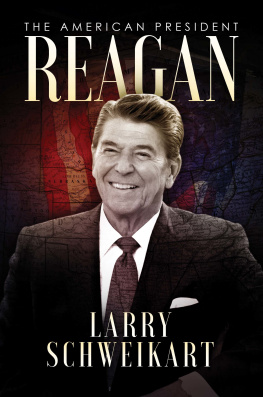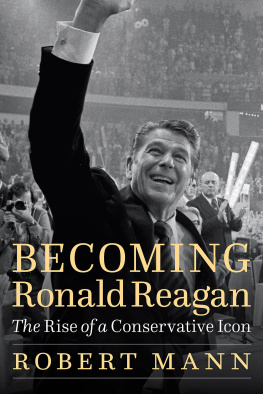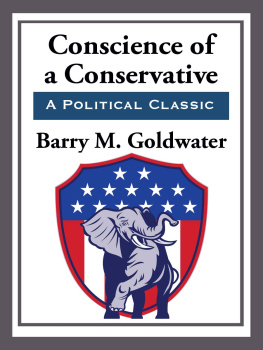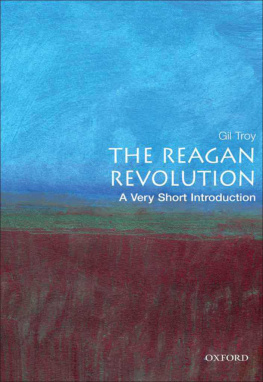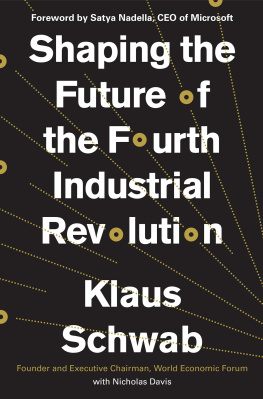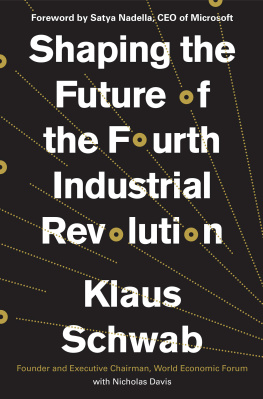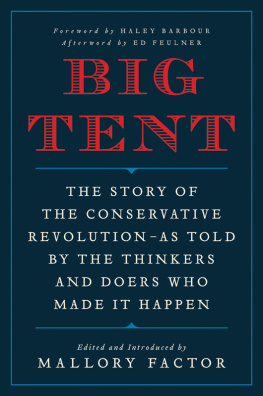The Illusion of a
Conservative
Reagan Revolution
The Illusion of a
Conservative
Reagan Revolution
Larry M. Schwab
With a new introductin by the author
First published 1991 by Transaction Publishers
Published 2017 by Routledge
2 Park Square, Milton Park, Abingdon, Oxon OX14 4RN
711 Third Avenue, New York, NY 10017, USA
Routledge is an imprint of the Taylor & Francis Group, an informa business
New material this edition copyright 2016 by Taylor & Francis
Copyright 1991 by Taylor & Francis
All rights reserved. No part of this book may be reprinted or reproduced or utilised in any form or by any electronic, mechanical, or other means, now known or hereafter invented, including photocopying and recording, or in any information storage or retrieval system, without permission in writing from the publishers.
Notice:
Product or corporate names may be trademarks or registered trademarks, and are used only for identification and explanation without intent to infringe.
Library of Congress Catalog Number: 90-21812
Library of Congress Cataloging-in-Publication Data
Schwab, Larry M.
The illusion of a conservative Reagan revolution / Larry M. Schwab.
p. cm.
Includes index.
ISBN 0-88738-413-7
1. Party affiliationUnited States. 2. Government spending policyUnited States. 3. ConservatismUnited States. 4. United StatesPolitics and government19811989. I. Title.
JK2661.S36 1991
320.5 20973dc
2090-21812
CIP
ISBN 13: 978-1-4128-6307-0 (pbk)
ISBN 13: 978-0-88738-413-4 (hbk)
Contents
3.1 Results of the First Gallup Poll Rating in Each Administration from Eisenhower to Reagan
3.2 Yearly Average of Presidential Popularity Ratings, 1953-88
3.3 Distribution of Presidential Popularity Ratings from Eisenhower to Reagan
4.1 Comparison of the Electoral Support of Liberal, Moderate, and Conservative Members of Congress, 1976-88 Elections
4.2 Ideology of Incumbents Defeated in 1976-88 Congressional Elections
4.3 Comparison of the Competitiveness of Liberals, Moderates, and Conservatives in the 1976-88 Congressional Elections
4.4 Correlation between House Members' ideological Ratings and Election Percentages, 1976-88 Elections
4.5 Comparison of the Voter Support Received by Liberal, Moderate, and Conservative Legislators in the 1976-86 California Assembly elections
5.1 Party Control of House and Senate Seats, 1920-38 and 1970-88
5.2 Democratic and Republican Percentage of the Popular Vote in House Elections, 1960-88
5.3 Party Control of State Legislatures and the Office of Governor, 1960-89
5.4 Political Party Identification, 1937-88
5.5 Percentage of Democratic and Republican registered Voters in Several States, 1988
5.6 Impact of Partisan Redistricting in Six States on the Winners and Losers in the 1982 House Elections
6.1 Agriculture Spending in the Federal Budget, 1976-88
6.2 Federal Government Spending, 1960-88
6.3 Surpluses or Deficits in the Federal Budget, 1960-88
6.4 Federal Government Receipts as a Percent of GNP, 1960-88
6.5 Comparison of Actual Defense Spending (Outlays) with Several Defense Spending Projections for the 1980s
8.1 Ideological Changes among Southern Representatives and Senators from 1968 to 1988
Several political commentators argue that the 1980s were a period of fundamental Republican and conservative change. Some of them believe the changes are so important that the 1980s should be seen as a watershed period in U.S. political history as significant as the 1930s. I oppose this thesis and point out why politics and policy have not fundamentally changed in a Republican and conservative direction. I demonstrate how policy developments and the political system during the 1980s often moved in the opposite direction from what should have happened in a fundamental conservative change or a Reagan revolution.
The early 1990s are an excellent time to study the political and policy developments of the 1980s because all the years of the decade can be examined. The analyses that were completed several years earlier missed important events, such as the Iran-Contra scandal, which occurred in the late 1980s. In addition, an analysis in the early 1990s provides the opportunity to examine what happened in policy and the political system after Ronald Reagan left office. Previous studies could only predict what would occur after 1988.
I wish to thank my family for the encouragement and help they gave me in writing this book. I also welcome the opportunity to acknowledge the assistance of Irving Louis Horowitz, Mary E. Curtis, and the other members of the Transaction staff. In addition, I want to thank Jean Belin and Carolyn Van Voorhis for typing the manuscript.
The author gratefully acknowledges the following publisher and publication for permission to use previously published material:
Larry M. Schwab. The Myth of the Conservative Shift in American Politics: A Research Note, Western Political Quarterly 41 (December 1988): 817823. Reprinted by permission of the University of Utah, Copyright Holder.
An important debate evolved during the past thirty-five years over the historical significance of the political and policy developments of the 1980s, and the impact of these developments on the political system during the following decades. Some political analysts argue that a historic conservative change occurred in politics and policy. They refer to this historic change as the Reagan revolution.
In this analysis, I take issue with this point of view and argue that the Reagan revolution is an illusion. The U.S. political system did not experience a fundamental conservative change in the 1980s or in the following twenty-five years.
I wrote a new introduction chapter for the paperback edition of the book that covers the 19802015 period. The following chapters in the paperback edition cover the 1980s and are the same as in the original edition.
The introduction chapter has two sections. The first is an explanation of the Reagan revolution thesis. The second is an explanation of why there was no Reagan revolution.
For this analysis, conservative is defined as support for (1) less government in the economy (e.g., lowering the corporate tax rate), (2) cutbacks in social and environmental programs (e.g., cutting welfare programs), (3) an aggressive U.S. role in foreign affairs based on a large and expanded military (e.g., increasing military spending), (4) the social policy agenda of evangelical Christians (e.g., banning abortions), and (5) a power shift from the federal government to state and local governments (e.g., transferring more control of federal programs to state governments).
The political analysts who support the Reagan revolution thesis do not completely agree on the significance of the events of the 1980s. Their interpretations vary somewhat. But they do agree on the central point that the 1980s represented a fundamental historic change in U.S. politics and public policies.
Rowland Evans and Robert Novak were among the first political commentators to use the concept of the Reagan revolution. They stated in 1981:
While Nixon spoke in the contentious rhetoric of hyperbole, his policies as president were moderate if not downright liberal, careful not to disturb the national political consensus dating back to Franklin Roosevelt. In contrast, Reagan spoke in moderate language while pursuing policies whose only intent was to destroy that consensus....


